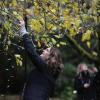January 16, 2000 - 4:00pm
Malaspina University-College pleaded guilty today in Provincial Court in Nanaimo to one charge under the federal Fisheries Act regarding the release of a deleterious substance (sediment) into the Cat Stream Creek.
This resolves the charges brought by Fisheries and Oceans Canada (DFO) against Malaspina University-College arising from the construction of playing fields on the Malaspina campus. The fields are a partnership between the Nanaimo Minor Baseball Association, Rotary Club of Nanaimo North, and Malaspina University-College.
As a result of land clearing activities on Malaspina property in September and October 1997, sediment entered the Cat Stream Creek, a tributary to the Chase River.
Work was stopped in early October 1997 by DFO officers due to concerns of muddy water from the site entering into the Creek. Subsequent investigation by DFO led to charges under the federal Fisheries Act against Malaspina University-College which concluded on Monday, January 17, 2000 before the Honourable Judge Sid Clark of the Provincial Court of British Columbia at Nanaimo.
At the sentencing, Judge Clark agreed with the joint sentence submission of Malaspina and the Crown providing for a $1,000 fine and an Order that a further $5,000 be spent by Malaspina on enhancement of the affected area. The submission takes into account the degree of impact on the creek caused by the discharge of the sediment and the fact that there was no evidence of dead or dying fish in the Cat Stream Creek.
“Sediment can harm fish by irritating fish gills, impairing feeding and covering spawning gravels,” said Bruce MacDonald, Area Chief of Fisheries and Oceans Canada’s Habitat and Enhancement Branch.
“We’re always aware of the necessity to protect the environment, and we made a concerted effort to prevent a possible drainage problem on the site during heavy rainfalls, such as the ones we experienced in the fall of 1997,” said Malaspina president Rich Johnston. “The precautionary measures we took, however, proved insufficient.”
“Malaspina sets very high environmental standards for programs and students, and we’ve been involved in many projects to restock local streams and rivers with fish, so to find ourselves in this situation This disappointing. We’ve taken steps to make sure that it won’t happen again,” Johnston said.
In this regard, Malaspina has agreed to expand its Heavy Equipment Operator curriculum to include instruction on the protection of fish and fish habitat when working in and about streams.
Both Malaspina and Fisheries and Oceans Canada look forward to the completion of the enhancement of the affected area.
Backgrounder
Community Sports Fields
Located on Malaspina University-College property, off Third Street.
A joint venture of the Nanaimo Minor Baseball Association, Rotary Club of Nanaimo North and Malaspina University-College, the project will see the creation of two fields that will accommodate soccer, rugby, and field hockey; two baseball diamonds; and warm-up/practice areas. The fields will be constructed as “all weather fields.”
The fields will accommodate the rising demand for local playing fields, as well as provide Malaspina University-College with sports fields for students in physical education programs. This collaborative project will ensure increased access to playing fields for community sports groups, while it will finally provide Malaspina’s nationally-ranked collegiate athletics and intramural programs with sports fields they can call their own.
The new fields, combined with the existing Nanaimo & District Secondary School fields, the Rotary Bowl track facility, the Serauxmen Stadium, and the proposed Aquatic Centre will constitute a substantial sports complex for the Nanaimo area.
Construction, materials and labour are estimated to cost $600,000. Malaspina University-College will attempt to secure $250,000. The remainder is expected to come from service clubs and donations from businesses and community agencies.
Initial funding for the project was provided by the Ministry of Highways, as partial compensation for land required to build the Nanaimo Parkway. Expenditures associated with the project including required remediation work, consultants’ reports and legal fees were covered by this funding, not by Malaspina’s $58-million operating budget.
Tags: In the Community






